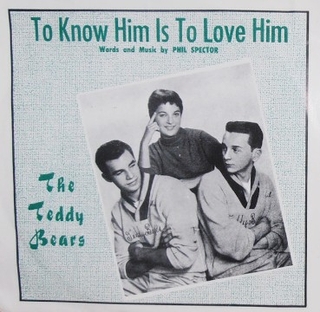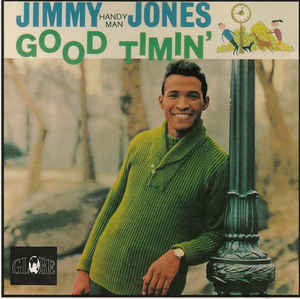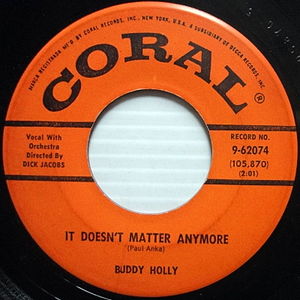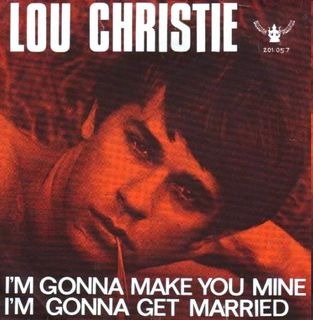Related Research Articles

"From Me to You" is a song by the English rock band the Beatles that was released in April 1963 as their third single. It was written by John Lennon and Paul McCartney. The song was the Beatles' first number 1 hit on what became the official UK singles chart but the second, after "Please Please Me", on most of the other singles charts published in the UK at the time. "From Me to You" failed to make an impact in the United States at the time of its initial release. Instead, a 1963 cover version released by Del Shannon resulted in the song's becoming the first Lennon–McCartney track to enter the US pop charts. The Beatles' original was re-released in the US in January 1964 as the B-side to "Please Please Me", and reached number 41.
"Needles and Pins" is a rock song credited to American writers Jack Nitzsche and Sonny Bono. Jackie DeShannon recorded it in 1963 and other versions followed. The most successful ones were by the Searchers, whose version reached No. 1 on the UK singles chart in 1964, and Smokie, who had a worldwide hit in 1977. Others who recorded the song include the Ramones, Gene Clark, Petula Clark, and Tom Petty and the Heartbreakers with Stevie Nicks.
"When" is a popular song written by Jack Reardon and Paul Evans and published in 1958.

"A World Without Love" is a song recorded by the British duo Peter and Gordon and released as their first single in February 1964. It was included on the duo's debut album in the UK, and in the US on an album of the same name. The song was written by Paul McCartney and attributed to Lennon–McCartney. The B-side was "If I Were You", written by Peter and Gordon.

"Anyone Who Had a Heart" is a song written by Burt Bacharach (music) and Hal David (lyrics) for Dionne Warwick in 1963. In January 1964, Warwick's original recording hit the Top Ten in the United States, Canada, Spain, Netherlands, South Africa, Belgium and Australia.

"Signed, Sealed, Delivered " is a soul song, by American musician Stevie Wonder, released in June 1970 as a single on Motown's Tamla label. It spent six weeks at number one on the U.S. R&B chart and peaked at number three on the U.S. Pop chart. In the same year, the song was also released on the album Signed, Sealed & Delivered.
"It's All in the Game" is a pop song whose most successful version was recorded by Tommy Edwards in 1958. Carl Sigman composed the lyrics in 1951 to a wordless 1911 composition titled "Melody in A Major", written by Charles G. Dawes, who was later Vice President of the United States under Calvin Coolidge. It is the only No. 1 single in the U.S. to have been co-written by a U.S. Vice President or a Nobel Peace Prize laureate.

"Do Wah Diddy Diddy" is a song written by Jeff Barry and Ellie Greenwich and originally recorded in 1963, as "Do-Wah-Diddy", by the American vocal group the Exciters. Cash Box described the Exciters' version as "a sparkling rocker that bubbles over with coin-catching enthusiasm" and said that the "great lead job is backed by a fabulous instrumental arrangement." It was made internationally famous by the British band Manfred Mann.
"Love Letters in the Sand" is a popular song first published in 1931.

"I'm Still Waiting" is a popular song, written and produced by Deke Richards and recorded by Diana Ross; it first appeared on Ross's 1970 album Everything Is Everything. The song reached No. 1 on the UK Singles Chart in August 1971. It also reached number one in Ireland.
"You're Nobody till Somebody Loves You" is a popular song written by Russ Morgan, Larry Stock, and James Cavanaugh and published in 1944. The song was first recorded by Morgan and was a hit for him in 1946, reaching the No. 14 spot in the charts. The best known version was Dean Martin's, which was released in 1960 and reissued in 1964.

"To Know Him Is to Love Him" is a song written by Phil Spector, inspired by the words on his father's gravestone, "To Know Him Was to Love Him". It was first recorded by the only vocal group of which he was a member, The Teddy Bears. The single spent three weeks at No. 1 on the Billboard Hot 100 chart in 1958, while reaching No. 2 on the UK's New Musical Express chart. Peter & Gordon and Bobby Vinton later each experienced chart success with the song, in 1965 and 1968, respectively.

"Glad All Over" is a song written by Dave Clark and Mike Smith and recorded by the Dave Clark Five.
"I'm Alive" is a 1965 number-one UK hit single by the Hollies, written for them by American songwriter Clint Ballard Jr. Although they originally passed the song over to another Manchester band, the Toggery Five, they changed their minds and recorded it, achieving their first No. 1 hit in the UK Singles Chart. It spent three weeks at number one in the UK and was also a No. 1 hit in Ireland. The song was released as a single in the US, entering the Cash Box singles chart on July 17, 1965, and peaking at No. 84 week of August 14, 1965, and it also appears on the US version of the 1965 Hollies album, Hear! Here!.

"She's Not You" is a 1962 song recorded by Elvis Presley and released as a single on RCA Victor.

"Good Timin'" was a number-one single in the UK Singles Chart during 1960, written by Fred Tobias and Clint Ballard Jr., and performed by Jimmy Jones. In the U.S., the follow-up to "Handy Man" went to number three on Billboard Hot 100 chart and number eight on the R&B chart. The song extrapolates the historical encounters between David and Goliath and between Columbus and Isabella as reason enough for a boy to meet a girl.

"It Doesn't Matter Anymore" is a pop ballad written by Paul Anka and recorded by Buddy Holly in 1958. The song was issued in January 1959, less than a month before Holly's death. "It Doesn't Matter Anymore" reached number 13 as a posthumous hit on the Billboard Hot 100 chart in early 1959, shortly after Holly was killed in a plane crash on February 3, 1959. The single was a two-sided hit, backed with "Raining in My Heart". "It Doesn't Matter Anymore" was Holly's last US Top 20 hit and featured the orchestral backing of Dick Jacobs. It was also successful in the United Kingdom, where it became the country's first posthumous number 1 hit.

"Norman" is a popular song written by John D. Loudermilk. Recorded by Sue Thompson in 1961, the song reached No. 3 on the Billboard Hot 100. The next year, Carol Deene released her version of the song in the United Kingdom, where it reached No. 24 on the UK Singles Chart. A cover version by British singer Carol Deene would be a hit in the UK in early 1962.

"I'm Gonna Make You Mine" is a song released in 1969 by Lou Christie. It was featured on his 1969 album I'm Gonna Make You Mine, arranged by Stan Vincent and produced by Vincent and Mike Duckman.

"A Little in Love" is a song recorded by Cliff Richard, released as the second single from his 1980 album, I'm No Hero.
References
- 1 2 3 4 Rice, Jo (1982). The Guinness Book of 500 Number One Hits (1st ed.). Enfield, Middlesex: Guinness Superlatives Ltd. p. 78. ISBN 0-85112-250-7.
- ↑ Roberts, David (2006). British Hit Singles & Albums (19th ed.). London: Guinness World Records Limited. pp. 162–3. ISBN 1-904994-10-5.
- ↑ "Discography". The-searchers.co.uk. Archived from the original on 2014-04-07. Retrieved 2014-04-05.
- ↑ "CHUM Hit Parade - July 20, 1964".
- ↑ "Silver Dollar Survey". WLS. 1964-07-24.
- ↑ "Hot 100". Billboard. 1964-07-11.
- ↑ "Number One Project". Liverpool Echo . Archived from the original on 5 December 2008. Retrieved 20 June 2022.